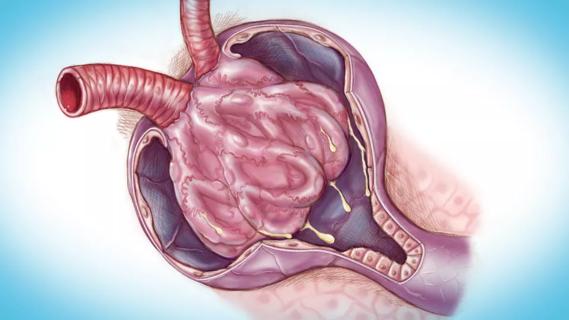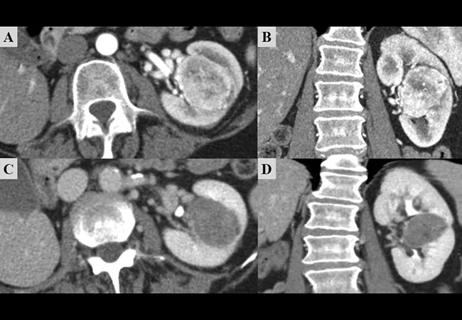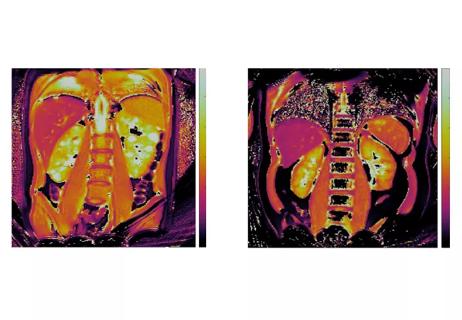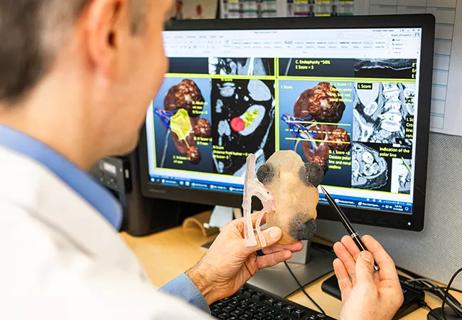Using sequencing data to identify novel factors linked to kidney disease with unknown origin

Millions of people are affected by kidney disease each year. While some types are well understood, others aren’t as straightforward. Treatments for patients with these cases are often complicated and not always effective. Despite researchers’ best efforts, the root causes of many types of kidney disease remain unknown.
Advertisement
Cleveland Clinic is a non-profit academic medical center. Advertising on our site helps support our mission. We do not endorse non-Cleveland Clinic products or services. Policy
Leslie Bruggeman, PhD, Inflammation & Immunity, is tackling the problem through a new lens.
“Without knowing the root cause of kidney disease, doctors can only manage the symptoms and not the underlying problem,” Dr. Bruggeman says. “We want to answer the big questions as to what initially triggered the disease, which can ultimately help us develop more effective treatments.”
When people develop chronic kidney disease (CKD), their kidneys become damaged and over time and may not clean the blood as well as healthy kidneys. If kidneys do not work well, toxic waste and extra fluid accumulate in the body and may lead to high blood pressure, heart disease, stroke and early death.
The Bruggeman Lab is analyzing existing repositories of genome-wide sequencing data from kidney biopsies. “These datasets are a comprehensive catalog of every gene expressed in the kidney, known as the transcriptome,” says Dr. Bruggeman, “but what many people don’t realize is that these genome-wide datasets also hold a comprehensive catalog of every infectious agent or microbe present in the kidney.” Focusing on these non-human sequences, or the metatranscriptome, the lab searched for infectious agents that associated with different kidney diseases. Their research was recently published in Kidney International.
Dr. Bruggeman and her team worked with the Nephrotic Syndrome Study Network, known as NEPTUNE, a North American consortium that engages scientists from around the world to study the research samples provided by participants. John O’Toole, MD, and John Sedor, MD, both leaders in the NEPTUNE Consortium, provided the diseased and healthy kidney biopsy datasets for the investigation. Nephrotic syndrome can be caused by several kidney diseases which are defined by the pattern of kidney injury (pathology) found in the kidney biopsy. NEPTUNE includes several CKDs in which the underlying cause is poorly understood, including focal segmental glomerulosclerosis (FSGS), minimal change disease (MCD) and membranous nephropathy (MN).
Advertisement
Dr. Bruggeman and her team looked for the presence and amount of viral RNAs in the NEPTUNE biopsies to see if they were associated with different CKDs to establish an association with an infectious cause.
The team first looked at FSGS, a disease in which scar tissue develops on the glomeruli, the small parts of the kidneys that filter waste from the blood. Previous studies had shown some common viral infections such as HIV or SARS-CoV-2 can cause FSGS. Dr. Bruggeman hypothesized that in those patients in which the cause for FSGS could not be determined, they may also be associated with a virus. “We actually found several similar viruses all belonging to the same family, suggesting this association with FSGS may be to a new virus that hasn’t been described yet,” says Dr. Bruggeman. “Now comes the hard work of characterizing exactly what this virus is.”
Unexpectedly, the team also identified a different virus associated with another CKD. Membranous nephropathy (MN) is an autoimmune disease that attacks only the kidney, for unknown reasons. Many researchers have focused on the immune aspects of this condition, but no investigations have pinpointed the underlying trigger. For MN, the team found a strong association with a papillomavirus that is known to cause cervical cancer. “These were discovery experiments,” she says. “We have shown associations, but there is a lot of work ahead of us to determine how these viruses actually cause injury to the kidney.”
Dr. Bruggeman’s findings have the potential to significantly alter what is understood about these CKDs, and importantly, may suggest treatment and prevention strategies that were not considered before. If a viral infection is the root cause of these CKDs, the medical profession has well-established road maps to fight viral infections, such as anti-viral medication for treatment or potentially developing vaccines to prevent CKD.
Advertisement
Editor’s note: This article was originally published by Cleveland Clinic Lerner Research Institute.
Advertisement
Advertisement

One pediatric urologist’s quest to improve the status quo

First single-port renal vein transposition reduces recovery time and improves outcomes

Fully-automated process uses preop CT, baseline GFR to estimate post-nephrectomy renal function

Belzutifan superior to everolimus in phase 3 clinical trial

Management of high-risk RMSK in the pre-and current eras of neoadjuvant therapy

NIH-funded study explores novel MRI technique to stage cystic kidney disease

AI-generated model bests predictive abilities of human experts

Study highlights benefits of nephrologist-led urine sediment analysis